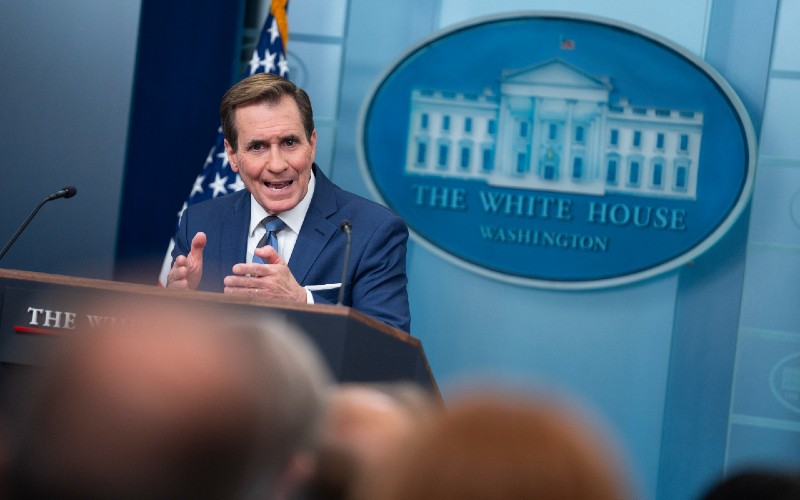Rep. Mike Turner (R-Ohio), the chairman for the House Permanent Select Committee on Intelligence, sounded alarm bells this week when he released a vague statement on X telling Americans of a “serious national security threat.”
Caught off guard by Turner's statement, the White House has since acknowledged its concern for Russia’s developing space-based nuclear weapons designed to target U.S. satellites that are critical to civilian communication, navigation, military operations and intelligence gathering.
 Dmitry Peskov, a spokesman for Vladimir Putin’s government, called the timing of the statement an effort to push a Senate-passed $95.3 billion foreign aid bill – most of it for Ukraine in its war against Russia – through the U.S. House and onto President Joe Biden’s sure signature.
Dmitry Peskov, a spokesman for Vladimir Putin’s government, called the timing of the statement an effort to push a Senate-passed $95.3 billion foreign aid bill – most of it for Ukraine in its war against Russia – through the U.S. House and onto President Joe Biden’s sure signature.
“It is obvious the White House is trying, by hook or by crook, to encourage Congress to vote on a bill to allocate money,” Peskov told Russia’s state-controlled news agency, TAAS.
'Does it look, suspect? Yeah'
Jody Hice, the Family Research Council Action president and former U.S. House member, didn’t completely embrace the Russian position but criticized Turner’s release, however vague, of sensitive information.
“Does it look, suspect? Yeah," he told told Washington Watch host Tony Perkins Thursday. "One thing you learn around this city, you've seen it over and over and over, is nothing happens around here without political motives behind it."

One of the House’s hot debates right now is FISA reform and whether to renew Section 702 of the Foreign Intelligence Surveillance Act, which allows U.S. law enforcement to conduct foreign surveillance without warrants.
Some see Section 702 as too strong an infringement the rights of U.S. citizens who at times are caught up in phone conversations or other communication with foreign nationals.
Rep. Andy Biggs (R-Arizona) says there’s been widespread abuse of FISA 702 and that it has been used “hundreds of thousands of times to spy on American citizens.”
Turner has been a strong supporter of renewing FISA 702.
"For this to just coincidentally come up right at the point where the funding for Ukraine and all these things, the FISA reauthorization, where those bills are in play … there’s no way anyone can convince me that that's just sheer coincidence,” Hice said.
The Fourth Amendment protects U.S. citizens from unreasonable searches and seizures by the government and is the basis of laws regarding search warrants, stop-and-frisk, safety inspections, wiretaps and other forms of surveillance. It’s also central to other aspects of criminal law and privacy law.
“We have known for a long time the threat that Russia poses to our country and our world,” Hice said, “therefore the timing of this when Chairman Turner is trying to push through this reauthorization of FISA is certainly no coincidence whatsoever. Quite frankly, it's shameful. This is an attack on the Fourth Amendment and the assurance the American people have that their government will not spy on them and seize their property.”
Timing questionable but Russian threat is real
FISA and homegrown politics aside, the Russian threat is not without merit, some military contacts tell AFN.
Bob Maginnis is a retired army officer and national defense analyst who has written several books related to this threat. He says the space-based threat is real and growing – and something that cannot be ignored.
"Our adversaries understand that if you want to be a global power, you have to control space – or at least use it," he tells AFN. "And there's plenty of evidence of this from our public officials, as well as their publications, that the Russians and Chinese have created arguably what are space-based weapons platforms to destroy our satellite systems when it's necessary."
As far as countermeasures, Maginnis isn't aware that the U.S. has deployed satellites that have weapons aboard such as lasers.

"However, the question is whether or not we have deployed or are planning to deploy the systems that could counter other weapons in outer space – if we haven't, I would think that it's time to do that."
Another question is whether the Biden administration will act or sit on its hands.
Gordon Klingenschmitt, a former U.S. Air Force strategic missile officer, believes the U.S. has the military capability but not the political will to counter potential threats made by Russia in outer space.
"First of all, [this] happened on Joe Biden's watch," he tells AFN. "And his signaling weakness or even intimidation of Russia is causing further aggression by them compared to when Trump was in office. Russia was afraid to invade Ukraine a second time on Trump's watch. But as soon as Biden got in there, [Russia viewed] America as weak [and decided to] be aggressive."
So, he argues there needs to be a deterrent strategy, which requires two elements.
"Of course, you have to have the capability, which I think we have; and you have to have the will, which I don't think we have," he describes. "When Joe Biden is mealy-mouthed and isn't addressing this [or] isn't publicizing this, it takes a congressman from Dayton, Ohio, to actually bring this to America's attention? Joe Biden should be the one taking the lead on this issue."

According to Klingenschmitt, America has the means to deter Russia via "classified assets" that he has personally seen and helped manage.
The threat you know could do more damage
Rep. Rich McCormick (R-Georgia), an emergency room doctor by trade, says that threat that Americans know – as millions pour across the southern border – could be more harmful than the threat many learned about in Turner’s social media post.
McCormick told Perkins that focus should be on drugs like fentanyl and other problems created by the border’s “nearly 2 million got-aways,” those who have not crossed peacefully into the country to take advantage of the administration’s generous asylum policy.
“The people that didn’t want to be caught are the most nefarious type. It doesn’t take much material to get into the United States for low-tech disruption of our cities. I go back to dirty bombs, EMPs (Electromagnetic Pulse), other contaminants (like) a fungus, bacteria, a new virus. It doesn’t take much fentanyl,” he said.
A total of 73,654 people died from fentanyl overdose in 2022. Fentanyl was involved in 90% of all deaths involving opioids.
“When I was in ER last year, I lost four patients. I'm just one ER doctor. I lost four patients anywhere from 16 to 37 years old. You can't do anything about it. I mean, this is a real invasion with real consequences, and these people from all different countries could mean all kinds of harm,” McCormick said.







